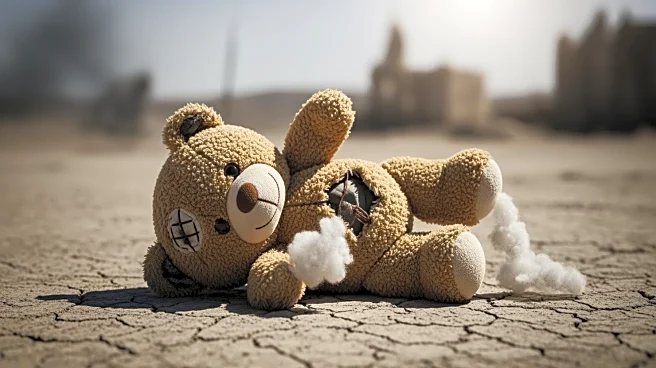What's Happening?
Sudan is currently facing one of the world's most severe humanitarian emergencies due to ongoing civil conflict. The United Nations reports that three million children under the age of five are acutely
malnourished, with hospitals overwhelmed by the crisis. Bashaer Hospital in Khartoum, one of the few remaining operational medical facilities, offers basic treatment free of charge, but families must pay for lifesaving medicines. The conflict has devastated infrastructure, including schools and playgrounds, leaving children without safe spaces. The war, which began as a power struggle between forces loyal to army chief Gen Abdel Fattah al-Burhan and RSF leader Mohamed Hamdan Dagalo, has turned Khartoum into a battlefield, trapping civilians in crossfire and bombardments.
Why It's Important?
The humanitarian crisis in Sudan has profound implications for the country's future, particularly affecting its youngest citizens. The destruction of educational facilities and safe spaces for children threatens to create a lost generation, with long-term impacts on Sudan's social and economic development. The lack of access to healthcare and nutrition exacerbates the situation, potentially leading to increased mortality rates among children. The international community faces challenges in providing aid and support due to the ongoing conflict, which complicates efforts to stabilize the region and address the humanitarian needs effectively.
What's Next?
The continuation of the conflict in Sudan suggests that the humanitarian crisis will persist, with further deterioration of living conditions for civilians. International organizations may increase pressure on Sudanese leaders to reach a ceasefire and allow humanitarian aid to reach affected areas. Efforts to rebuild infrastructure and provide education and healthcare will be crucial in the long-term recovery of the country. The situation calls for increased international attention and support to prevent further loss of life and to assist in the rebuilding of Sudan's social fabric.
Beyond the Headlines
The ethical implications of the Sudan conflict are significant, with allegations of war crimes, including targeting civilians and depriving them of essential resources. The destruction of cultural and social institutions raises concerns about the long-term impact on Sudanese identity and heritage. The crisis highlights the need for international accountability and intervention to prevent further human rights violations and to support the rebuilding of a peaceful and stable society.











